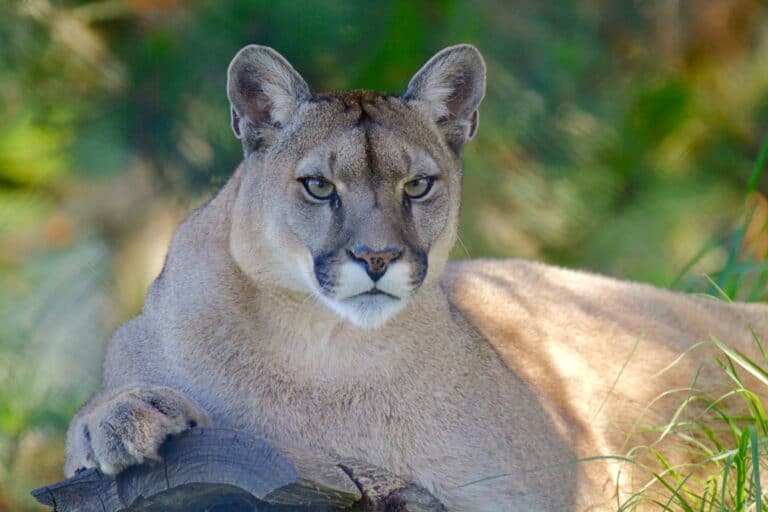
It’s funny how the tables get turned on us in a survival situation. Suddenly problems that seem unthinkable or irrelevant grow entirely too likely and too pressing while most of our everyday issues shrink into non-existence.
One such issue that might become a very real problem if surviving out of the wilderness is being attacked and eaten by a mountain lion.
North America’s largest and most dangerous feline rarely has run-ins with people, but attacks do occur and some people are eaten.
What is it possible to turn the tables once again on these big cats? If you were forced, could you kill and eat a mountain lion in a survival situation?
Yes, you absolutely can eat mountain lion. So long as their meat is correctly prepared and thoroughly cooked mountain lion is highly nutritious.
I know the idea sounds doubly crazy to most of us because of mountain lions aren’t endangered species, first, and because Americans as a rule do not eat cats, even great big murderous ones.
However, you might have to get used to the idea of eating all sorts of atypical animals during a survival situation, and you shouldn’t pass up a good mountain lion steak if you’re out of food.
Keep reading and we will tell you everything you need to know.
Where Do Mountain Lions Live?
Mountain lions are one of the most widely distributed cats in the western hemisphere, yet they are also one of the most elusive.
These stealthy creatures can be found from Canada all the way down to the southern tip of Chile. In North America, they are primarily found in the western United States and Canada, although there have been sightings as far east as the Carolinas.
Like most large animals, their historical ranges and populations were far greater, and today they are only a tiny fraction of that.
Mountain lions are solitary animals, and so they tend to roam wide ranges in search of food.
They are masterful and can be found inhabiting a number of different ecosystems including woodlands, grasslands, marshes, and even deserts in pursuit of food. Their diet consists mostly of deer, elk and goat and so they can be found anywhere wild populations of these animals are.
For this reason, it is always important to be aware of your surroundings when hiking, hunting or camping in mountain lion territory.
Nutritional Facts about Mountain Lion Meat
Mountain lion meat, contrary to traditional opinions, is highly nutritious and safe meat when properly cooked.
It is high in protein and low in fat, making it an ideal food for a survival situation. It also contains a good amount of iron, potassium, and vitamins A & E.
What Does Mountain Lion Meat Taste Like, Anyway?
Mountain lion meat, though not in any way popular or readily available, is said to taste very much like dense, slightly bland pork.
Notably, it is rarely described as gamey or odd despite the traditional wisdom of prior generations.
Long regarded as a “trash meat” by hunters, I am happy to report that instances of this claim are in all likelihood due to improper processing or cooking, not due to a lack of quality in the meat itself.
Like much wild game, because of its low-fat content it can be quite tough and dry if not cooked properly.
The best way to cook mountain lion meat is to slow roast it or stew it, and keep it moist using fat, broth or other liquids.
Is it Safe to Eat Mountain Lion Meat when Raw?
No! Mountain lion meat must be thoroughly cooked to be safe. Mountain lions are host to various germs and parasites that can be transferred to humans through their meat.
Among the many diseases you might catch from consuming raw or undercooked mountain lion meat are:
Toxoplasmosis- a disease caused by a single-celled parasite that can lead to severe brain damage or death in young children or unborn babies
Trichinellosis- caused by a parasitic worm that can infect the muscles and cause muscle pain, fever, and vomiting. Complications with the nervous system are not out of the question.
E. coli- a common and potentially deadly foodborne illness caused by bacteria found in the intestines of many animals.
So, in short, eating raw or undercooked mountain lion meat is not advised. It is imperative that you cook it to a sustained temp of least 165 degrees Fahrenheit in order to kill off any harmful bacteria and other bugs.
Can You Eat Mountain Lion Skin?
You can, but this is not recommended: It is very tough and not particularly palatable, and cleaning the skin of its fur is going to be quite the task.
Save your effort and energy for the rewards of the meat, of which you will have plenty if you bag a mountain lion.
Can You Eat Mountain Lion Bones?
No, though you can get nutrition from the marrow. First things first, humans are not supposed to eat bones- they are way too hard for our wimpy teeth and jaws, a choking hazard and may lacerate our insides if we break them.
That being said, know that the marrow inside bones from large animals like mountain lions is packed full of nutrients like fat and protein that can help keep you alive, or even bulk up other foods, particularly stews and soups.
To get to the marrow, you can crack or saw the bones open with a variety of tools or even a large rock. You can then cook the marrow in any number of ways or use it as an ingredient.
Can You Eat Mountain Lion Organs?
Yes, but you should be extra cautious. Many organs of wild animals, particularly the liver, can store high levels of toxins like mercury and other metals.
These toxins can potentially make you very ill or even kill you if consumed in large enough quantities.
Some organs like the heart and kidneys are generally good eating and safe (though the kidneys tend to be a very acquired taste).
Other organs like the stomach and intestines can be safe to eat, but require careful and thorough cleaning followed by proper cooking to make them palatable.
Failing to properly clean the digestive organs can easily result in contracting disease.
Tom Marlowe practically grew up with a gun in his hand, and has held all kinds of jobs in the gun industry: range safety, sales, instruction and consulting, Tom has the experience to help civilian shooters figure out what will work best for them.


